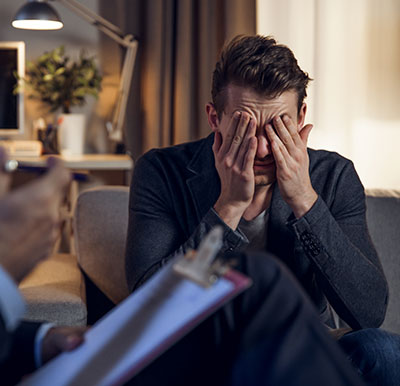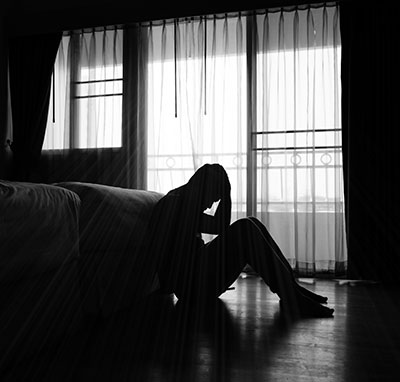Testosterone and Depression: What is the Connection
There is a definite connection between testosterone levels, anxiety, and depression.
According to the Mayo Clinic, depression is defined as "a mood disorder that causes a persistent feeling of sadness and loss of interest. Also called "major depressive disorder" or "clinical depression," it affects how you feel, think, and behave and can lead to a variety of emotional and physical problems.”
Current statistics from the Anxiety and Depression Association of America say that major depressive disorder affects an estimated 16.1 million adults annually in the United States alone.
The World Health Organization describes depression as "the leading cause of ill health and disability worldwide."
There is a growing body of evidence that suggests a link between low testosterone and depression.
Testosterone is critical in many ways for physical wellbeing. Testosterone is necessary to build muscle, to burn fat, to keep your bones healthy, and to regulate and stimulate many other physical processes. Testosterone also plays a vital role in maintaining emotional health in men and women.
Specifically, current research has shown a definitive link between low levels of testosterone and increased depression and anxiety. A 2016 study published in the journal, Psychoneuroendocrinology found that in older men, "low serum testosterone was associated with an 86% increased hazard of depression."
This study echoed earlier research, which has found a strong link between low testosterone, depression, anxiety, and other emotional issues in both men and women.
How Does Testosterone Influence Mood and Depression?
Medical professionals do not like to say that imbalances in testosterone are a definitive “cause” of depression, but there is little doubt that testosterone is one of many hormones that influence mood and feelings of depression and anxiety.
Low testosterone also leads to erectile dysfunction, low sex drive, and a lack of physical energy. These physical symptoms can lead to less enjoyment in life. That could lead to depression. But there could be something more to the link between low-T and depression.
Testosterone is necessary to produce serotonin and other important neurotransmitters. Neurotransmitters like serotonin are the brain’s "feel-good" chemicals that help to regulate mood and stave off depression. In fact, most antidepressants work by keeping levels of serotonin high.
Testosterone levels decline in both men and women as they age. Low testosterone could be the reason why depression and anxiety are more prevalent in people over 40, that it is in younger people.
How Does Testosterone Influence Anxiety?
Similar to depression, there is also evidence that your level of testosterone can and does influence feelings of fear and anxiety.
Studies have shown that low testosterone can increase feelings of anxiety and anxiety symptoms. What is even more interesting is that researchers have found that men who have been diagnosed with low testosterone and have complained of feelings of anxiety saw significant decreases in anxiety after being prescribed testosterone replacement therapy.
The researchers qualified their results by indicating that decreased anxiety could be influenced by other positive impacts of testosterone replacement, such as alleviating depression and improving sexual function. However, they also concluded that testosterone is “believed to impact anxiety levels independent of other factors.”
These kinds of results are not found only in men.
A 2016 study found an important connection between testosterone levels and anxiety in women. In this study, the researchers found that women with social anxiety disorder (SAD) experienced less “gaze avoidance and aversion to images of angry faces” – core indicators of the kind of social anxiety typical of SAD – when treated with testosterone. According to the researchers, these findings suggest that for patients with SAD, testosterone replacement therapy might help to alleviate social anxiety disorder symptoms and submissive behaviors.
This study is significant because we know that low testosterone is also a problem in older women. Women suffer age-related testosterone deficiency just as men do. However, unlike men, who lose testosterone gradually over time, women’s testosterone levels drop significantly when they reach menopause. We all know that depression, anxiety, and mood swings, are major symptoms of menopause.
We used to think that the emotional distress most women experience during menopause was largely due to the lack of estrogen that occurs in the post-child-bearing years. However, current research seems to indicate that the depression and mood swings typical of menopause are more related to low levels of testosterone than estrogen.
Men and women with low testosterone are at a greater risk of developing depression and anxiety.
Can Testosterone Therapy Cure Depression?
Doctors do not like to speak of cures when it comes to testosterone and depression. But it is certainly an effective treatment for managing depression and anxiety, equally as good, and in some cases better than typical antidepressants such as SSRIs. In fact, studies have shown that in patients where "first-line" treatments for clinical depression such as SSRI have failed, testosterone replacement has worked.
There can be many causes of clinical depression. The link between low testosterone and depression is now well known. Does that mean that testosterone could replace antidepressants and/or other therapies in people with depression? Not for those who do not have other symptoms of low testosterone. However, for men and women who are over 45 and are experiencing the other symptoms of low testosterone, testosterone replacement therapy has been shown to boost mood and reduce anxiety, depression, and irritability.
In addition to anxiety and depression, other signs and symptoms of low testosterone include:
- Sexual health issues
- Mental fogginess
- Lack of energy
- Inability to build muscle, even while exercising
- Weight gain, particularly belly fat
- Disrupted sleep
Does Stress Increase Testosterone?
Stress does not increase testosterone. You might think that during a crisis, your "fight or flight" reaction is triggered by testosterone or causes a burst of testosterone to flow into your blood to deal with the emergency. This is a misconception. The hormone related to stress and your “fight or flight” reaction is cortisol.
Cortisol is the "stress hormone," it is cortisol that is released into your blood that causes the release of adrenaline and the higher heart rate that gives us the physical boost we need to escape or handle danger. Cortisol and testosterone are antagonists. High levels of cortisol in your blood actually lower your testosterone level. Therefore men who are often under chronic stress are likely to experience low testosterone.
How Can High Testosterone Cause Depression?
Depression is almost always associated with low testosterone levels. However, there have been incidences where too much testosterone has led to aggressive behavior in men and women – so-called “roid rage,” and as a consequence may cause depression.
But this is rather uncommon and usually occurs when people abuse testosterone and is rarely if ever, a side effect of normally prescribe testosterone replacement therapy.
How Can Low Testosterone Cause Depression?
We know that testosterone is a “neuroactive steroid,” meaning that it can influence mood, making it reasonable to assume that low testosterone can cause depression, moodiness, and anxiety. But, researchers hesitate to use the word "cause" and would rather say that low testosterone and depression are linked.
There are several reasons that low testosterone can influence depression. There are the known chemical effects of testosterone and how it interacts with other mood-causing hormones such as cortisol and neurotransmitters like serotonin and dopamine.
Beyond the biochemical influences of low testosterone on mood, the other known physical issues caused by low testosterone — weight gain, loss of energy, loss of libido, and sexual dysfunction – all can cause a man to feel low and depressed.
Does Testosterone Therapy Always Help Depression?
Depression is a complicated condition with many causes. And no two people suffering from a depressive disorder are exactly alike. Because depression is so complex, that is precisely why we cannot draw direct a "cause and effect" between depression and low testosterone but have to understand that they two are related. It would be great if we could say that testosterone improves feelings of depression and anxiety 100% of the time. But the truth us no drug or medical therapy can make that kind of a claim.
However, in our practice, if a person has low testosterone and depression, we have found that there is an excellent chance that their symptoms will improve over the course of a program of testosterone replacement therapy.
Many of our patients have reported a complete reversal or at least a significant improvement in their mood after treatment with testosterone therapy.
Also, testosterone tends to benefit many of the symptoms that can lead to mood changes. Supplemental testosterone helps improve sleep, energy, body composition, health, appearance, and more. These positive changes can benefit a person’s emotional state and his or her total outlook on life.
What Does the Medical Research Have to Say About Testosterone and Depression?
Numerous clinical trials have shown a definite link between testosterone, mood, depression, and anxiety.
A 2004 study on the incidence of depression in men with low testosterone found that men with low testosterone who were studied over a two-year period were four times more likely to be diagnosed with clinical depression. The head researcher on the projects, Molly M. Shores, MD, director of the Veterans Affairs Puget Sound Health Care System and the University of Washington in Seattle, said, "Older men would be particularly vulnerable to [the effects of low testosterone on depression] because serotonin receptors are already decreased from normal aging…
Because depression is a major risk factor for suicide, and older men have the highest suicide rate of any age group in the United States, identifying conditions [such as low testosterone] that increase the risk of depressive illness could be an important opportunity for early intervention and treatment."
But the most definitive study on testosterone and depression was published in 2019 in the journal JAMA Psychology.
The study was a meta-analysis or a "study of studies" that looked at testosterone and depression. According to the authors, their analysis was the “largest examination to date of the association of testosterone treatment with depressive symptoms in men.”
Specifically, the researchers aimed to "examine the association of testosterone treatment with the alleviation of depressive symptoms in men and to clarify moderating effects of testosterone status, depression status, age, treatment duration, and dosage."
After analyzing relevant studies that had nearly 2000 participants, the researchers concluded, “Testosterone treatment appears to be effective and efficacious in reducing depressive symptoms in men, particularly when higher-dosage regimens were applied in carefully selected samples.”
Testosterone replacement therapy has been shown to improve mood and reduce anxiety and depression in patients with low testosterone.
Now that you know a bit more about the links between testosterone, depression, and anxiety, why not contact us today, and find out more about the many life-changing benefits of testosterone replacement therapy.






